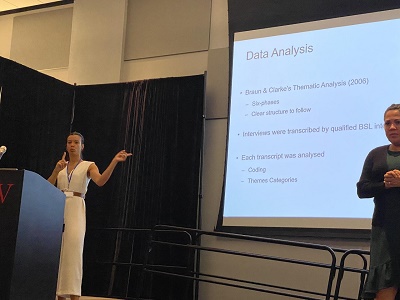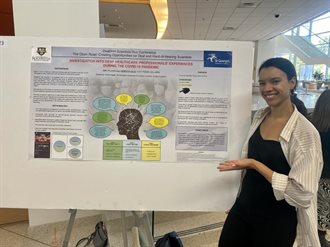Class of 2022 Physiotherapy alumna presents research on the experiences of deaf healthcare workers
Published: 22 September 2022
Alumna and newly-qualified Physiotherapist, Oluchi Zelic, has recently presented her findings on the experiences of deaf healthcare workers during the Covid 19 pandemic at the Deaf/HH Scientists Roc Conference at the University of Rochester.
The conference brings together aspiring and established deaf and hard of hearing scientists and allied groups to network and build a community. She also facilitated a workshop to help raise awareness of the challenges faced by deaf healthcare workers, and how colleagues can offer support, at AMPHL (Association for Medical Professionals with Hearing Loss) conference in Las Vegas.

Oluchi, who was born deaf, started her Masters in Physiotherapy before the Covid-19 pandemic. By the time she was in the fifth week of her first placement, lockdown restrictions meant that trainees were told to work from home. Oluchi found it challenging to adapt to moving online and says, ‘The university tried their best to meet my needs and make content more accessible, but it was a big adjustment to move from face-to-face interactions to trying to follow everything online. I was used to being able to meet my interpreters and note-takers face-to-face in order to make sure I hadn’t missed anything in my notes, so we had to adapt and find new ways to work together online.’
Oluchi’s other placements took place during the pandemic, when students were able to return to the workplace. On her second placement, with all healthcare staff wearing masks, she relied completely on her hearing device. She says, ‘I was no longer able to lip-read and use facial expressions to help interpret conversations. This made interactions very difficult and I found each day of my placement incredibly tiring because of this.
‘By my fourth placement, clear masks had been introduced in order to help with lip reading, but not all staff would use these, and taking notes for patients was still a challenge. It could be frustrating when people became impatient or didn’t understand some of the barriers I faced.’
- Oluchi Zelic -
When the time came to choose her research project, Oluchi decided to interview deaf healthcare professionals working within the NHS, to find out about their own experiences during the Covid-19 pandemic. Oluchi explains, ‘After my experience on my placement, I wanted to find out what sort of strategies they used to cope during the pandemic. I worked with a research partner to recruit interviewees online for a pilot study, and in the end we spoke to five staff from different healthcare professions. We asked questions to find out about the impact of the pandemic on their mental health, what helped them cope, and what sort of information and support they received from their workplace.
‘It was interesting to get a range of perspectives, as some staff were profoundly deaf and did not use any hearing devices, whereas some used either hearing devices or sign language, or a combination. Participants all had slightly different experiences, but faced lots of similar challenges at work.’
As well as finding out about the experiences of healthcare workers, Oluchi discovered that there was potential to improve accessibility for hearing impaired patients, too. She explains: ‘I discovered that the majority of NHS videos (covering guidance on using NHS services and information for patients on managing different health issues) were lacking subtitles. In fact, only 1% were subtitled and often did not provide a British sign language version.’
‘After speaking with these staff, one thing that stood out was that they might all have an improved experience at work if we helped increase colleagues’ deaf awareness, so that they are more mindful and understanding of our needs.’
‘Sometimes deafness is an invisible disability; people never know I am deaf until I speak, or tell them that I am deaf. I realised that helping people understand that deaf people have their own culture and language could help colleagues work better together.’
- Oluchi Zelic -
During Oluchi’s fourth and fifth placements, she started delivering deaf awareness training to her teammates. She also wrote an article for Frontline magazine about her experience as a deaf Physiotherapy student. Both the training and article received very positive responses from staff, and Oluchi says, 'Those who had received the training or read my article were able to spread deaf awareness by helping explain to other colleagues how to better accommodate my needs at work as a deaf person.’

When Oluchi found out that the Deaf/HH Scientists Roc Conference was looking for deaf healthcare and science professionals who could share their experience and research, she shared the abstract from her research project and was awarded a scholarship to attend. This led to Oluchi finding out about the AMPHL in Las Vegas, which focused on research related to the Covid-19 pandemic.
Oluchi presented her work at the conference and says, 'It was an amazing experience, as I got to meet deaf healthcare professionals working in so many different areas, and found out about lots of different types of technology with the potential to help me at work. I had so much useful advice from others at the conference about how I could improve the situation in the UK for deaf healthcare workers, and went home with so many new ideas. Now I just need to find the best way to put some of these into practice.’
Oluchi would like to give deaf awareness training as part of her future role as a Physiotherapist and is also considering completing a PhD in a few years’ time. She says, ‘I would like to do more research to find out what I can do to support deaf healthcare workers and patients. But before that, I’d like to gain first-hand experience within the NHS so that I can find out more about the areas we could develop for the greatest impact.’
Reflecting on her experience as a student at St Georges’, Oluchi says:
‘When I was struggling, the university did not give up on me. I liked the fact that St George’s is a small university and close-knit community, and staff took care to make sure I got the support I needed.‘
- Oluchi Zelic -
My tutors and my research supervisor were so supportive and encouraged me to carry on, even when I was struggling on my placements during the pandemic. I’m very grateful for the encouragement they have given me, and how that’s helped me work towards enhancing the experience of deaf healthcare workers.”